- Home
- Donald Hamilton
The Shadowers Page 2
The Shadowers Read online
Page 2
“Well, they should be just about ready for you below, sir,” he said, and showed me to the door, or hatch, by which we’d come out. “Watch your head going down the ladder...”
I couldn’t tell you exactly where aboard the ship the little movie theater was, but it had obviously just seen use as a conference room, judging by the scattered paper, empty glasses, full ashtrays, and the smell of tired tobacco smoke. There were only two people in it now. One was a woman. The first impression she made on me can best be described by saying that after a brief glance to make sure I didn’t recognize her, I looked at the man.
He was lean and gray-haired, with black eyebrows. He wore a charcoal-gray flannel suit, a neat white shirt, a conservative silk tie, and he may have looked like a well-preserved middle-aged banker or businessman to some people, but he’d never look like that to me. I happened to know he was one of the half-dozen most dangerous and ruthless men in the world.
I recognized him, all right. I should, having worked for him for well over fifteen years, off and on.
Mac said, “Thank you, Mr. Braithwaite. Wait next door, if you please.”
“Yes, sir.”
Mac watched the young lieutenant (jg) turn smartly and depart. He smiled briefly. “They train them well up there on the Severn, don’t they?”
I wasn’t particularly interested in Braithwaite’s training, but if Mac wanted to apply the casual touch I’d play along, for a while at least.
“He’s a good boy,” I said. “He hasn’t allowed himself to be human once, so far. And he drives a sports car like an artist. But he’s going to sir me to death if he isn’t careful.”
Mac said, “I seem to recall another young officer who had a predilection for that word. He was a pretty good driver, too.”
“Yes, sir,” I said. “But, sir, I don’t think you’ll have as much luck getting this one to switch services, sir. He likes the Navy, sir.”
Mac shrugged. “I’ll make a note of his name nevertheless. There may come a time, world conditions being what they are, when personal preferences will again have to be disregarded. Not that you were hard to persuade, if I remember correctly.”
I said, “I always was a bloodthirsty kid. I don’t think this one’s quite mean enough for you.”
“Well, we’ll see.” He studied me appraisingly. “You look fit. The rest has done you good.”
“Yes, sir.”
“I was sorry to hear about the lady’s accident.”
I looked at him for a moment. He’d never approved of my interest in Gail Hendricks. He’d thought her a spoiled bitch, rich and unreliable, not at all the sort of dedicated, dutiful little girl he preferred to have his men associate with, if they couldn’t be satisfied with professional entertainment. We have, of course, no real private life. All our attachments, amorous and otherwise, are a matter of record in the Washington office.
I said, “I’m sure you cried all the way to the filing cabinet to pull her card, sir.”
He didn’t call me down for disrespect. He just said, “Of course you took steps to determine that it was an accident.”
“Yes, sir. She was upset, for personal reasons we don’t have to go into here. She’d had too much to drink. She was driving much too fast. It was a long, sweeping curve and she swung out toward the edge a little too far and tried to come back. They think all they need are power brakes and power steering to make two tons of luxury machinery handle like a stripped-down racing Ferrari. At that speed, she’d be riding the damn curve right at the limit of tire adhesion for a car that big. When she hauled on the wheel, the Cad started to slide. She panicked and hit the brakes and everything broke loose and she went off into the trees. There was no evidence of sabotage or any other fancy monkey business. There were no bullet wounds, hypo marks, or unexplained bruises. Somebody could simply have pulled alongside and forced her over, of course, but there’s no indication that anybody did.”
Mac grimaced. “I don’t like accidents involving our people. There’s always a question. Well, I’ll keep in touch in case they should turn up something, but we can’t spend any more time on it now.”
He glanced at the woman standing nearby, waiting. When he looked her way, she came forward to join us. At close range, I saw that I’d done her a slight injustice in dismissing her with a glance. It was the makeup, or lack of it, that had fooled me. There was also the straight, mousy, pulled-back hair and the horn-rimmed glasses.
She was moderately tall. Her bulky tweed suit made her figure hard to judge correctly. The straight, loose-fitting jackets currently fashionable may come in handy to disguise an unwanted pregnancy—a problem this lady wasn’t likely to have to face, I judged—but they can hardly be called flattering. Her sensible shoes did nothing for her legs and ankles. Still, she wasn’t obese, emaciated, or deformed.
As for her face, it had a lot of forehead and chin, as well as a grim, unhappy mouth. I put her age between thirty and thirty-five, although it could have been less. I decided that I didn’t like her. There’s really no excuse for a potentially presentable female to deliberately go around looking like Lady Macbeth after a hard night with the knife. I mean, it’s a kind of reverse vanity that implies a lot of real conceit somewhere.
While I was looking her over, she was giving me a thorough examination from hair to toenails. She turned to Mac and spoke without enthusiasm.
“This is your alternate candidate, Mr. McRae? Isn’t he rather tall for an agent? I supposed they were all fairly inconspicuous people.”
“This is Mr. Paul Corcoran,” Mac said, passing over the personal comments. “Paul, Dr. Olivia Mariassy.”
Dr. Olivia Mariassy barely acknowledged the introduction with a nod my way. “I suppose that’s an alias,” she said to Mac. “It’s a poor choice. The man is obviously of Scandinavian descent, not Irish.” Still speaking to Mac, she frowned at me: “Well, at least he doesn’t have the slick, ivy-league look of the other prospect. I don’t think I could stomach that crew cut and that button-down collar very long, not to mention the pipe. I think a pipe is nearly always an affectation, don’t you? Do you smoke?”
The final question was thrown at me. “No, ma’am,” I said. “Not unless my cover requires it.”
“Cover?”
“Disguise.”
“I see. Well, that’s something,” she said. “Only a fool would poison himself with coal tar and nicotine after all the evidence that has been published. Do you drink?”
“Yes, ma’am,” I said. “I also run around with women. But I don’t gamble. Honest.”
That got me another long look through the horn-rimmed glasses. “Well,” she said, “a rudimentary sense of humor is better than none at all, I suppose.”
Mac said, “Mr. Corcoran’s training and experience—”
“Please! I’m not questioning the professional qualifications of either candidate. I’m sure they are both very rapid on the draw, if that’s the proper phrase. I’m sure they’re both capable and ruthless and perfectly horrible. Do you play chess?”
She’d aimed that one at me. “A little,” I said.
Olivia Mariassy frowned thoughtfully. There was a brief silence. Her head came up. “Well, he’ll have to do. The other was quite impossible. If I have to marry one of them, I’ll take this one.” She turned away and bent over a worn briefcase on one of the theater seats, took out a small black book and handed it to me. It was Capablanca’s Chess Fundamentals. “You’d better study that, Mr. Corcoran,” she said. “It will give us something to do on our honeymoon. Good-bye, Mr. McRae. I’ll leave the arrangements to you. Just let me know what you want me to do.”
We watched her walk out with her briefcase. Mac didn’t speak and neither did I. I won’t say I couldn’t. I just didn’t try.
3
Down inside the big ship where we were—wherever that was—there wasn’t a thing to be heard except the steady, everpresent rumble of the heavy propulsion machinery. All the planes in the world could have been landin
g overhead or none at all. There was no way of telling.
Mac laughed shortly. “Apparently my instinct was correct. I hadn’t really considered you for the job because I wanted you to have the full leave you’d been promised, but when you called last night I had a hunch you were just the man we needed here. We’ve been having a good deal of difficulty in persuading the lady to cooperate. She gave us an indignant refusal at first, and even after she suddenly changed her mind for reasons that aren’t entirely clear—I didn’t venture to cross-examine her— she proved very hard to suit in the matter of a working partner.” He studied me thoughtfully and spoke without expression. “I suppose it was that intriguingly sinister, ruthless, yet somehow intellectual look that overcame her spinster scruples, where a straightforward display of masculine charm and virility merely offended her. Or maybe she just thought you looked old enough to be reasonably safe.”
“Go to hell,” I said, “sir.”
“Well, you seem to have won the beauty contest, Eric,” he said, using my code name to remind me gently that this was an official conversation, and that while many liberties were permitted, there was only one boss. “Matrimony is an essential part of the assignment, you understand. Dr. Mariassy is valuable government property. You can judge how valuable by the caliber of the visitors who came on board today to confer with her and her colleagues. We have obtained permission to use her for bait, but you have to be close enough to her, day and night, not only to watch her but to protect her as well. You can only do that in the character of a lover or husband.”
“Sure,” I said. “But with two choices, why do we have to pick the legal one?”
“Aside from the fact that she is hardly the type for an illicit love affair, the lady has a career to think of. Neither she nor the government department for which she works wants a scandal attached to her name. After the job is finished, of course, steps will be taken to dissolve the blessed union at no cost to either party. But it must be a genuine marriage while it lasts.”
I said, “Well, if she can stand it, I guess I can.”
“You will have to,” Mac said dryly. “And you will have to be very diplomatic, in private. The rude and arrogant manner she affected today would seem to indicate that she is frightened.”
“You think she might panic and pull out, sir? I’ll try not to scare her.”
“On the other hand,” he said, “your performance must carry conviction—both performances. There must be no hint of fakery.” He paused. “It’s a Taussig operation, Eric. You know what that means. We’re not up against amateurs. We can’t be too careful.”
I frowned. “Taussig? Hell, I thought the old maestro was through. I thought he’d been put out to grass after that Budapest fiasco in fifty-four—well, to a desk in Moscow.”
“That was our understanding until quite recently, but apparently it was wrong.” Mac glanced at me. “Do you remember the details of what he did in Budapest? I mean, what he almost did in Budapest?”
“Yes, sir,” I said. “I wasn’t in on it myself, but I was briefed on it afterward. We all were. It was the multiple shadow technique. He had been trying to sell it for years as a substitute for open military action. He had them all covered, all the Hungarian politicians who weren’t being properly cooperative. Every doubtful man or woman in public life was shadowed by an agent, trained in homicide who had orders to take his subject out instantly and permanently when the whistle blew. The only trouble was, somebody got nervous and whistled prematurely. Four or five prominent Hungarian citizens died, and there was a big scandal, but the real takeover had to wait for the Russian tanks in fifty-six or -seven, whenever it was.” I grimaced. “You mean he’s managed to talk them into letting him try the same thing again?”
“The evidence says so.”
“In Pensacola, Florida?” I asked. “Why Pensacola, for God’s sake? What’s important enough there to warrant the Budapest treatment?”
Mac said, “The exact nature of the Pensacola target is irrelevant. The important thing is that there is one, and that a number of valuable people, Dr. Mariassy included, are in danger, and that we must find Taussig and stop him before he gets all his agents in a position to act.”
“Sure,” I said. “And just how does Washington plan for me to find him? I gather they don’t have his location pinpointed, or there would be no need to use the female scientist for a decoy.”
“He was seen in Pensacola a few months ago,” Mac said. “That’s what drew our attention here. Unfortunately the operative who recognized him—not one of ours—had other business and let it go with a routine report. Taussig has not been spotted since. You’ll have to work at it from this end.”
“Starting with a marriage ceremony.” I opened the book I was still holding and read the name boldly written on the flyleaf in black ink. “‘Olivia Eloise Mariassy.’ Eloise, for God’s sake. What’s she a doctor of, anyway?”
“Medicine,” Mac said. “Aerospace medicine, to be exact. She is one of a group of government scientists using the facilities of the U.S. Naval School of Aviation Medicine, in Pensacola, and of Eglin Air Force Base up the coast, for a special project. Sometimes, when the missile range at Eglin is inadequate, they call on Cape Kennedy for help. This much you should know. Exactly what the project is, doesn’t concern you.” He made a wry face. “Or so I was instructed to tell the man who was selected for this assignment.”
“Sure,” I said. “We’re supposed to save the country blindfolded, as always. I suppose it’s some kind of a super-retaliation gizmo, or Taussig and his superiors wouldn’t be so interested.”
“Perhaps,” Mac said.
“Aerospace medicine, eh? I’ll look it up.” I snapped the book shut. “Of course, I won’t have much time for research. I’ll be playing chess with my bride.” This got no reaction from Mac and I said, “What makes us think Taussig’s going to take the bait?”
“He may already have taken it,” Mac said. “Not Taussig himself, of course. Presumably he was here only to arrange the details of the local surveillance setup; he probably won’t risk showing himself here again. He’ll control the machinery from a distance as he always does. It’s his strength and his weakness. It’s the reason we’ve never been able to reach him; and at the same time it’s the reason for the failure of the Budapest operation. He was too far away to take charge when a subordinate panicked.” Mac paused. “As far as Pensacola is concerned, we have determined that several of Dr. Mariassy’s colleagues have already developed shadows. We are gambling that she has.”
“Gambling,” I said. “Can’t we confirm before we start?”
“Not without the risk of alerting Taussig’s man, or woman, if there actually is one assigned to Dr. Mariassy, as we hope. I had the investigators withdrawn for that reason. You will determine if she is being shadowed, Eric. If she is, you will lead the shadower to a suitably isolated spot, safe from interference by the police or anybody else, and learn from him, or her, the whereabouts of Emil Taussig.”
I listened to the rumble of the big power plant, somewhere far below in the giant ship. “Sure,” I said softly. “Sure. Just like that.”
Mac nodded. “Just like that.”
“It’s pretty crude,” I said. “There are limits to what can be done with the thumbscrews, sir. If we hit a stubborn one, it could get messy.”
Mac’s voice was unrelenting. “If you become queasy, you can call in help. I’ll have an interrogation team standing by.”
“Keep your damn I-team,” I said. “My stomach is as strong as anybody’s. It just seems to me we could be a little more clever about this.”
“Cleverness has been tried,” Mac said. “A great many very clever people have been working hard on this without notable results. That is why we were called in. Remember, cleverness is not our specialty, Eric. Other things are.”
“Yes, sir,” I said; then I frowned. “I thought you said these shadows were recently acquired.”
“In Pensacola, yes.”
/> “I see,” I said slowly. “Then this local manifestation isn’t the first and only—”
“By no means,” Mac said. “It was merely selected by us as a suitable point for a counterattack. Do you think I would have been authorized to give you such orders if only one small group of scientists was in danger?”
“It’s a big thing, then? Nationwide? Old Taussig is shooting everything in the musket including the ramrod?”
“It is big,” Mac agreed. “It was first diagnosed at a base of the Strategic Air Command up north in... well, never mind where. SAC reported that key flight personnel were being watched by enemy agents whose job might be to keep them from reaching their planes under certain circumstances.”
“You mean,” I said, “if the big bell started ringing?”
“Yes. I regret to say that the report was not, at first, taken very seriously by other government departments. It sounded rather farfetched to anybody who had not heard of Taussig’s Budapest venture; and those SAC people have a recognized persecution complex. They are not really happy unless they think somebody is trying to do them in, one way or another.”
“Paranoia is the word, sir,” I said helpfully.
“Thank you, Eric. Paranoia. Gradually it developed that even allowing for the paranoia of the Strategic Air Command, there was evidence to indicate that something very unpleasant was being planned on a very large scale. One cell was discovered in Washington, D.C. You can imagine the furor this caused, behind tight security, of course. Then Taussig himself was spotted in the country, and somebody did remember Budapest, and the pieces fell into place. Cells are now known or suspected as far apart as San Diego, California, and a certain little-known government activity in Maine. We do not know how many there are. We do not know who is scheduled to die and who is not. This creates a certain amount of panic among various important people who can bravely face the possibility of having millions of people killed by nuclear weapons.”

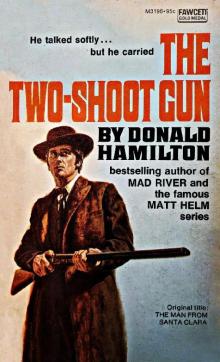 The Two-Shoot Gun
The Two-Shoot Gun Mad River
Mad River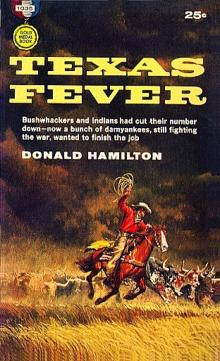 Texas Fever
Texas Fever Ambush at Blanco Canyon
Ambush at Blanco Canyon The Big Country
The Big Country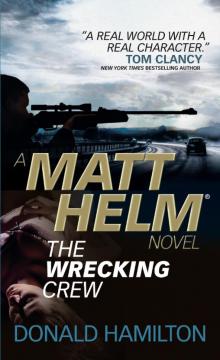 The Wrecking Crew
The Wrecking Crew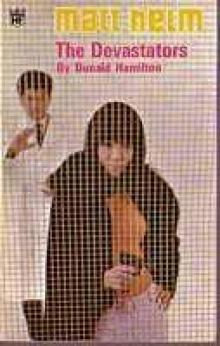 The Devastators mh-9
The Devastators mh-9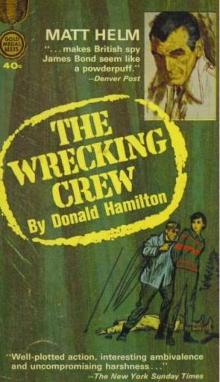 The Wrecking Crew mh-2
The Wrecking Crew mh-2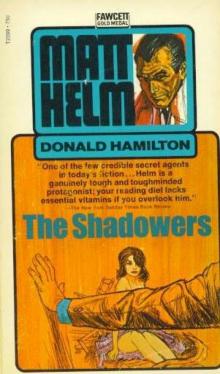 The Shadowers mh-7
The Shadowers mh-7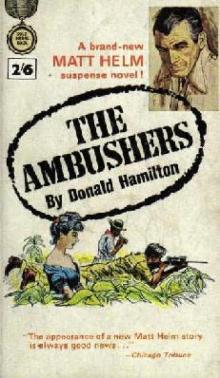 The Ambushers mh-6
The Ambushers mh-6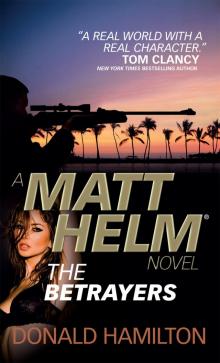 The Betrayers
The Betrayers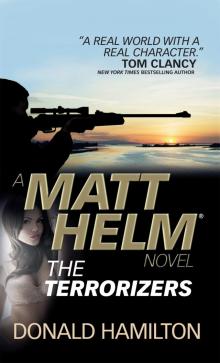 The Terrorizers
The Terrorizers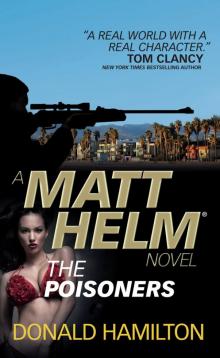 The Poisoners
The Poisoners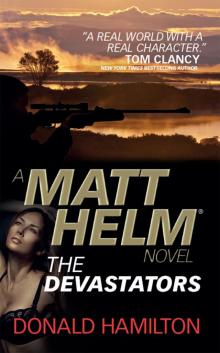 The Devastators
The Devastators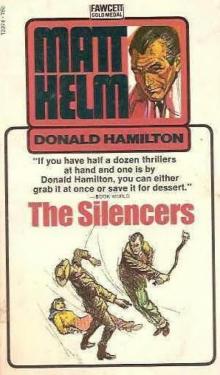 The Silencers mh-5
The Silencers mh-5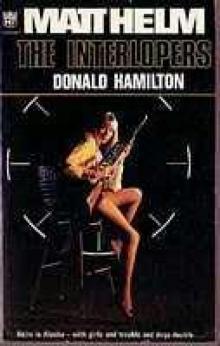 The Interlopers mh-12
The Interlopers mh-12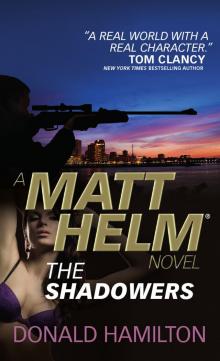 The Shadowers
The Shadowers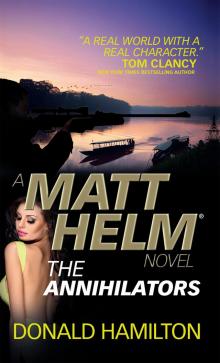 The Annihilators
The Annihilators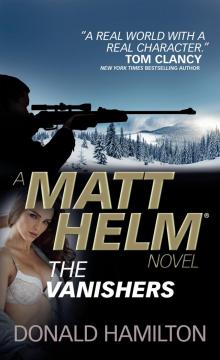 The Vanishers
The Vanishers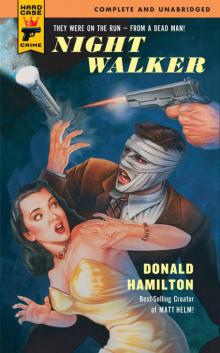 Night Walker
Night Walker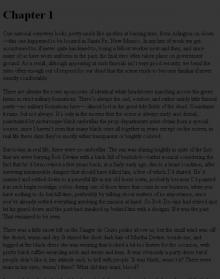 The Revengers
The Revengers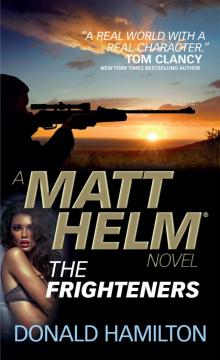 The Frighteners
The Frighteners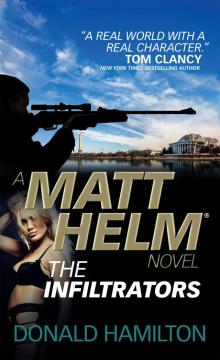 The Infiltrators
The Infiltrators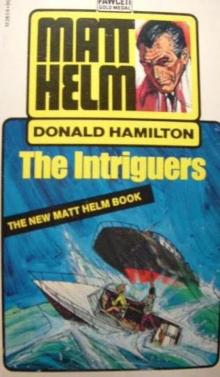 The Intriguers mh-14
The Intriguers mh-14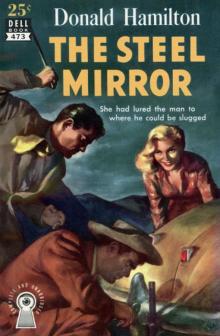 The Steel Mirror
The Steel Mirror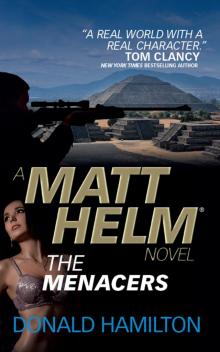 The Menacers
The Menacers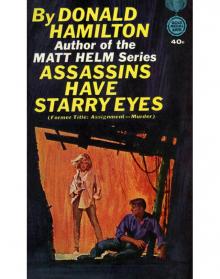 Assassins Have Starry Eyes
Assassins Have Starry Eyes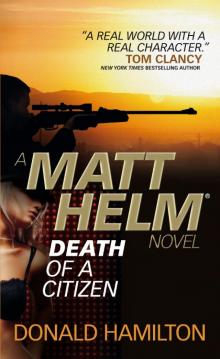 Death of a Citizen
Death of a Citizen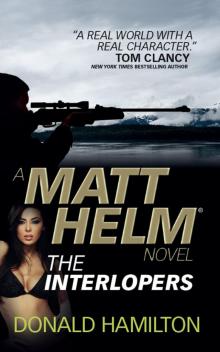 Matt Helm--The Interlopers
Matt Helm--The Interlopers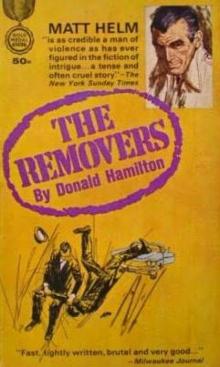 The Removers mh-3
The Removers mh-3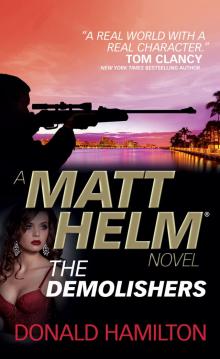 The Demolishers
The Demolishers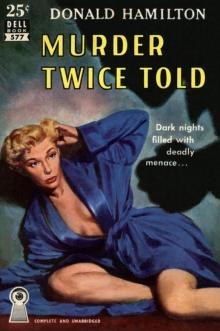 Murder Twice Told
Murder Twice Told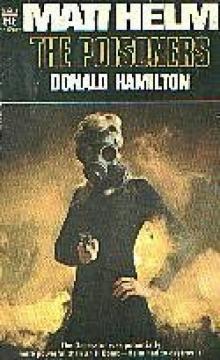 The Poisoners mh-13
The Poisoners mh-13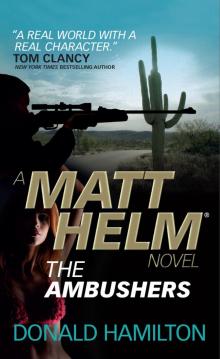 The Ambushers
The Ambushers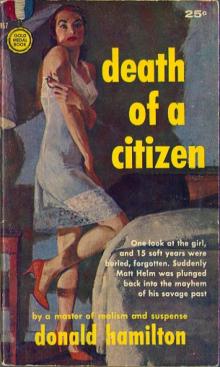 Death of a Citizen mh-1
Death of a Citizen mh-1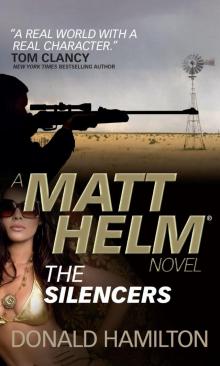 The Silencers
The Silencers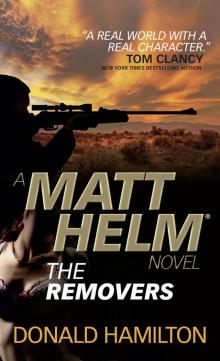 The Removers
The Removers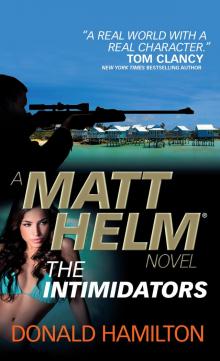 The Intimidators
The Intimidators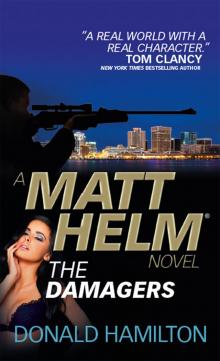 The Damagers
The Damagers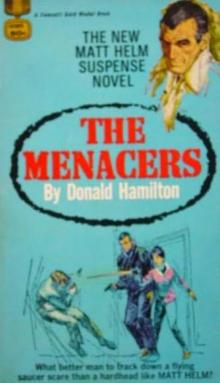 The Menacers mh-11
The Menacers mh-11 The Retaliators
The Retaliators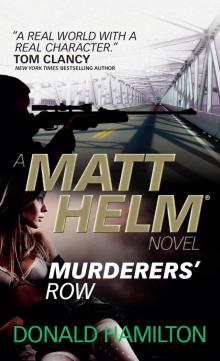 Murderers' Row
Murderers' Row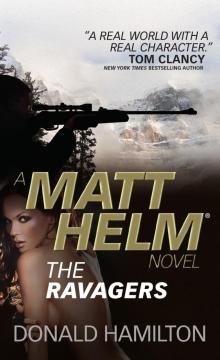 The Ravagers
The Ravagers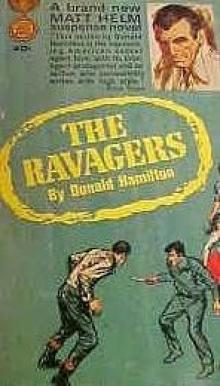 The Ravagers mh-8
The Ravagers mh-8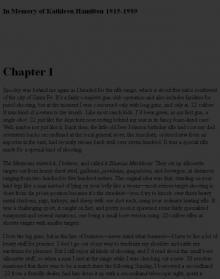 The Threateners
The Threateners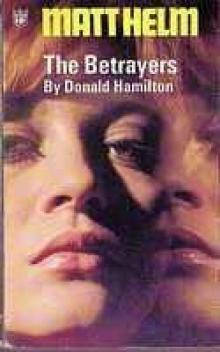 The Betrayers mh-10
The Betrayers mh-10